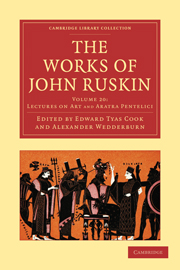Book contents
- Frontmatter
- Contents
- LIST OF ILLUSTRATIONS
- INTRODUCTION TO THIS VOLUME
- LIST OF RUSKIN'S OXFORD LECTURES DURING HIS FIRST TENURE OF THE SLADE PROFESSORSHIP (1870—1878)
- PART I “LECTURES ON ART” (INAUGURAL COURSE DELIVERED AT OXFORD IN HILARY TERM, 1870)
- PART II “ARATRA PENTELICI” (SIX LECTURES ON THE ELEMENTS OF SCULPTURE, DELIVERED AT OXFORD IN MICHAELMAS TERM, 1870)
- APPENDIX: LECTURES AND NOTES FOR LECTURES ON GREEK ART AND MYTHOLOGY (1870)
- I “THE STORY OF ARACHNE”: A LECTURE DELIVERED AT WOOLWICH, DECEMBER 13, 1870
- II “THE TORTOISE OF AEGINA”: AN UNDELIVERED LECTURE IN CONTINUATION OF “ARATRA PENTELICI”
- III “THE RIDERS OF TARENTUM”
- IV “THE EAGLE OF ELIS”
- V GREEK AND CHRISTIAN ART: AS AFFECTED BY THE IDEA OF IMMORTALITY
- VI SOME CHARACTERISTICS OF GREEK ART IN RELATION TO CHRISTIAN
- Plate section
V - GREEK AND CHRISTIAN ART: AS AFFECTED BY THE IDEA OF IMMORTALITY
Published online by Cambridge University Press: 07 September 2011
- Frontmatter
- Contents
- LIST OF ILLUSTRATIONS
- INTRODUCTION TO THIS VOLUME
- LIST OF RUSKIN'S OXFORD LECTURES DURING HIS FIRST TENURE OF THE SLADE PROFESSORSHIP (1870—1878)
- PART I “LECTURES ON ART” (INAUGURAL COURSE DELIVERED AT OXFORD IN HILARY TERM, 1870)
- PART II “ARATRA PENTELICI” (SIX LECTURES ON THE ELEMENTS OF SCULPTURE, DELIVERED AT OXFORD IN MICHAELMAS TERM, 1870)
- APPENDIX: LECTURES AND NOTES FOR LECTURES ON GREEK ART AND MYTHOLOGY (1870)
- I “THE STORY OF ARACHNE”: A LECTURE DELIVERED AT WOOLWICH, DECEMBER 13, 1870
- II “THE TORTOISE OF AEGINA”: AN UNDELIVERED LECTURE IN CONTINUATION OF “ARATRA PENTELICI”
- III “THE RIDERS OF TARENTUM”
- IV “THE EAGLE OF ELIS”
- V GREEK AND CHRISTIAN ART: AS AFFECTED BY THE IDEA OF IMMORTALITY
- VI SOME CHARACTERISTICS OF GREEK ART IN RELATION TO CHRISTIAN
- Plate section
Summary
1. So far, then, both the schools are precisely similar; both are pursuers of truth—vivid, continual, modest in their hunger and thirst after this freshly perceived nature. But the pursuit took place under very opposite conditions. You recollect, I hope, how much, in the course of my lectures in the spring, I dwelt upon the distinction between the men who work, so far as they are sincere, without hope of a future life, and those in whom that hope, however dim, is the ground of their chief energies. Of every great art school this is the first question to be asked, in order to understand its character—Does it, or does it not, believe in the immortality of men?
2. And observe that this question is one utterly distinct from the one so often put with it, as to belief in the existence of a God, or Gods. The two subjects of faith have nothing whatever in common, or of necessary connection. It is quite possible to believe in the immortality of men without recognizing the existence of any other than human spirits. And it is quite possible to believe in the annihilation of men, or of grasshoppers, without therefore supposing that men or locusts are the only creatures possible; or denying the probability that there may be living around us spirits more exalted above humanity than we are above insects, having the power of Gods over us now, and incapable of change in the future. Note therefore distinctly, once for all, that the question of belief or disbelief in Death is one; the question of belief or disbelief in God is another.
- Type
- Chapter
- Information
- The Works of John Ruskin , pp. 403 - 406Publisher: Cambridge University PressPrint publication year: 2010First published in: 1905



